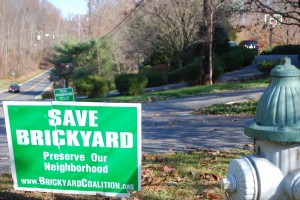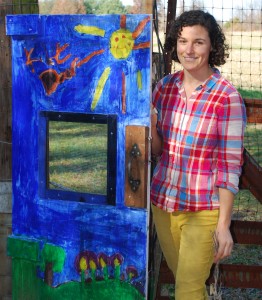This article was published in Dirt Magazine and written by Becca Tucker (Pete’s sister)
Fifteen miles from the White House grows a variety of Native American red polenta once extinct in the United States. Farmer Nick Maravell has been propagating heirloom seeds here, smack dab in the middle of suburban Potomac, Maryland, for three decades. His red polenta and other rare plant varieties have escaped contamination by genetically modified pollen thanks to an unlikely ally: a buffer of McMansions separating Maravell’s 20 acres from commercial farms.
But those McMansions have children in them, and those children play soccer. In 2011, the Board of Education revoked Maravell’s lease and instead leased the land to Montgomery County, which in turn plans to lease it to a youth soccer organization that wants to build a soccer complex. The suburbs that have insulated Nick’s Farm may, in the end, swallow it.
The community – whether because of love for the farm or an aversion to the lights and traffic a sports complex would bring – has sued the Board of Education for violating the Open Meetings Act. The lawsuit made headlines. But there is a quieter campaign underway. Sophia Maravell, 24, has moved home to save the farm where she grew up. This story is about Sophia.
When Sophia went to the private Georgetown Day School in D.C., “it wasn’t real cool to grow up on a farm.” It wasn’t until she went away to Colorado College that she changed her mind. After college, she enrolled at the Farm School, a teaching farm in Athol, Massachusetts. When she found out her dad’s farm was in trouble, she came home last January and put what she’d learned to work.
The community had been talking about making Nick’s Farm into an educational farm. The farm was already an informal incubator program, employing young farmhands who went on to start their own farms. But Sophia made it legitimate by creating an educational nonprofit called Brickyard Educational Farm. Brickyard Educational Farm consists of a 1/3-acre garden and a flock of chickens, located in, but separate from, Nick’s Farm. 
“I don’t work for my dad,” Sophia is firm in pointing out.
In Brickyard’s first year, Sophia reached 1,000 kids through in-school presentations, and another 500 kids took field trips to the farm. “Who’s heard of endangered animals?” Sophia asks when a class gets off the bus. Hands shoot up. “Okay, who’s heard of endangered vegetables?” No hands. “That’s what I want to talk to you about today.”
The kids rotate through stations, learning to harvest, plant, weed, compost, and care for the chickens. They even learn to grind farm-grown corn and soy to make chicken feed. “We could put kids on a task that we really needed to get done,” Sophia laughed. “It would’ve been on my to-do list for weeks.”
Now the conversation had shifted. The campaign was no longer a bid to save a private organic farm, but an agricultural education center. The new slogan was the all-inclusive “Save this Soil.” Judging from the green “Save Brickyard” signs that have popped up like weeds in every backyard on the block, Sophia had hit on something.
Maryland Governor Martin O’Malley wrote a letter to the president of the Montgomery County Board of Election and the County Executive that begins: “I believe we are about to make a big mistake in destroying acres of a productive organic farmland and its soils, which could be a priceless asset to the education, health, and well-being of generations of Montgomery students.” 
The agrarian writer Wendell Berry wrote to the Montgomery School Board: “For reasons of which you are undoubtedly aware, the need for agricultural education in urban areas is great and urgent. Moreover, a twenty acre tract that has been farmed carefully for thirty-two years probably cannot be duplicated, and therefore should be preserved if at all possible.”
If the Maravells succeed in staying on their land, Sophia plans to turn the entire 20 acres into a multi-faceted educational farm. Here’s her vision: The kids’ garden plot will expand to cover a three acre garden, and will include goats and sheep in addition to chickens. The food grown there will go back into the schools. Ten acres will be subleased out to beginning farmers, who can share the tractors, equipment, shed and machine shop – helping them over the major hurdles of land access and capital investment. And seed saving will continue on seven acres, along with a seed-saving apprenticeship program. “There’s a whole different seed saving skill set,” said Sophia. It’s a totally different way of growing, and small organic seed savers are a dying breed.”
We’ll see about that.
Related links: savethissoil.org; brickyardeducationalfarm.org

